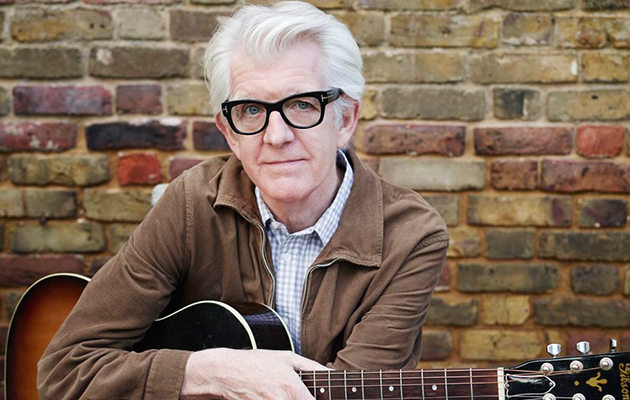Originally published in Uncut's January 2014 issue (Take 200). Making tea in the kitchen of his downtown Brentford pad, Nick Lowe ponders the theory that The Beatles ruined pop music. “Because after them, everyone thought they should write their own material – which of course most couldn’t,�...
Were you were still playing in Rockpile at the time?
Yes. But it was a side gig, because Dave Edmunds came from a different generation and the other guys didn’t really get what we were up to at Stiff. They were great but it was an old-fashioned rock’n’roll band and I had fancy pants ideas.
And you did – fleetingly – become a bona fide pop star.
Yes, which I liked for all sorts of reasons. The music, obviously. But also getting a table in a restaurant, getting attention from girls who wouldn’t normally look twice. It was a crazy time.
In the middle of all this, you married Carlene Carter.
We were totally in love with the idea of each other, and we had such a great time. But as a marriage it was doomed to failure. There was no way we could have sunk into domesticity. Apart from the fact that she was and is fantastic, I got to meet her mum and step-dad, June and Johnny Cash, and those two were a major influence on me.
In what way?
They were a great example of how to behave. They were big stars but so gracious. John was having trouble at that point. His career was starting to falter, he was running himself ragged trying to pay for this enormous operation he had, with scads of musicians and roadies, and offices and ex-sons-in-law with their hands out. He was working his arse off. He was a wonderful bloke, I love him and June to this day.
Why did your career turn sour in the mid-1980s?
I started to hate the records I was making. Suddenly it was “Hello, it’s time for a new record.” I’d have one or two decent songs and a few ideas, but I had gone to the well too many times. I was uninspired and uninspiring, pretty much an alcoholic, wretched. My marriage with Carlene had petered out. I didn’t like myself and I felt foolish because I had been a producer and I knew it was coming. I had yukked it up with management on the 14th floor and made disparaging remarks with them about artists. I knew how it worked. I had an impressive résumé for a guy in his early thirties. Done time in the fleshpots of Germany: tick. Served in the pub rock wars: tick. Stiff Records, there at the beginning: tick. Written hits for others and produced them: tick. Yet I didn’t feel I had done anything really good.
How did you resolve it?
I wanted to be in music for the long haul, and at that time there weren’t too many examples. Frank Sinatra. Chuck Berry, Jerry Lee. But though everyone dug them no-one cared about their records any more. It was OK to grow old in jazz or country, but not in pop. I thought there must be a way to do it, to write and record for myself.
So what happened?
In 1986, Elvis Costello gave me a job in his band The Confederates touring Australia and Japan, just playing rhythm and doing backing vocals. A very nice job. One night he said, “Why don’t you open with a 20-minute solo set?” and pressured me into it. I went out thinking it would be awful. But it was Japan, so they were very sweet and enthusiastic. They arranged a solo show in Tokyo and I became fascinated by the solo thing. It brought focus about the songwriting. I’d be playing thinking, ‘Why did I write this awkward part?’ Afterwards the songs became more considered. Nowadays it can take me weeks to get something down to three minutes, the length that would fit on an old 45 single, which is hotwired into me as the really cool length of time. When I do shows, I keep the songs coming and they help each other, so that you don’t leave room for people’s attention to wander.



